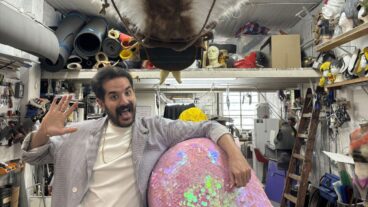Alpha-Omega’s microelectrode implants enable doctors to evaluate disease symptoms before and after surgery.Ten years ago Imad Younis and his wife Reem founded Alpha Omega Engineering that supplies labs and hospitals with equipment that maps the brain. The equipment is helping researchers worldwide study and treat neurological diseases such as Parkinson’s.
Alpha Omega works with leading research institutions to supply brain researchers with the specialized equipment they need to study and treat movement disorders, and other brain-related diseases. The company produced $2.6 million in sales last year through manufacturing and sales of two major systems: microelectrode recording and stimulation devices for pure research and clinical use.
The company’s technology works by inserting microelectrodes into the brains of Parkinson’s patients to do online recording and stimulation, enabling surgeons to evaluate disease symptoms before and after surgery and target deep brain simulator implants.
Research customers in the United States, such as the John Hopkins University, the National Institute of Health, Columbia University, and Yale University use Alpha Omega’s tools for the exploring auditory, visual, and motor functions of the brain. Half of Alpha Omega’s 200 units sold worldwide to date are in use in the United States, where they serve as a critical function in brain research.
Direct clinical use of Alpha Omega’s equipment includes treating patients with movement disorders, such as Parkinson’s. Since receiving FDA approval for this indication in 1999, Alpha Omega has installed its device in leading U.S. clinics such as UCLA Medical Center, the Mayo Clinic, and the University of Illinois at Chicago.
It is Alpha Omega’s goal to shorten brain surgery procedures from an average of eight hours to about half an hour.
“Our device can help doctors work with the brain in semi-autopilot mode,” Imad said. “It will be possible for them to quickly maneuver through the brain in an accurate way, causing much less trauma to a Parkinson’s patient, who may need several treatments.”
Imad attributes his success to close collaboration with Israel’s leading research institutions, including the Hebrew University and Hadassah Hospital in Jerusalem and Weizmann Institute of Science in Rehovot.
“My company wouldn’t be flying if it weren’t for the support of the electro physiology department at the Hebrew University, with Professors Moshe Abeles, Hagai Bergman, and Eilon Vaadia on my side,” Imad said.
About ten years ago, Prof. Bergman asked Imad to develop a specialized conditioning system for microelectrode recording lab for recording neural activity of the brain.
“Bergman provided the trigger for my move into the medical field to develop our tools for commercial use,” Imad said.
The success of this first collaboration prompted Ehud Ahissar from Weizmann Institute of Science to work with Alpha Omega to develop extra-cellular recording systems for exploring the brain.
“Most of the equipment that I use for my research is supplied by Alpha Omega,” said Ahissar, who works intensively with the Alpha Omega to improve electrophysiology equipment. Weizmann Institute uses the equipment for basic research on learning and memory that may lead to treatments for people with sensory impairments.
Working with the Hadassah Hebrew University Hospital, Alpha Omega developed a neural signal detection system known as the EPS or Electrode Positioning System which positions electrodes in the brain with extreme accuracy.
The cooperation with Hadassah has grown to the point where Alpha Omega can supply a whole setup for a lab that records neural activity. Its main applications are for exploring and learning the different functions of the brain, and for finding treatments for different mental diseases related to movement disorders, mental disorders, and chronic pain.
On top of the long list of collaborations, Alpha Omega and a team of professors are looking to the future of wireless microelectrode recording and stimulation devices that can be implanted into humans and animals for neuroprosthetic applications and neurosurgery.
Alpha Omega has more than 30 employees. The company is owned by Imad and Reem Younis, and has a U.S. subsidiary in Atlanta, Ga.












